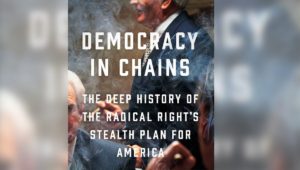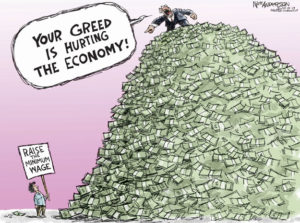Basic income, at least basic income the way I propose it, is Capitalism, through and through. Capitalism is about private property, private enterprise, private profits, and, not least of all, private decision making. Socialism, on the other hand, is about public enterprise, public profits, and, ostensibly, public decision making. To me, that’s the attractive part. Giving people the ability to decide what does and doesn’t happen in the large scale economy that directly affects them. I understand the romance there. I really do. I, like many, am sick of feeling like the imperturbable powers that be have run roughshod over my economic prospects only to turn around and call me lazy for not keeping up. Why is it getting harder for Americans to keep up generation by generation? Why am I paying more for the same services than my grandparents did and getting less in return? Why am I called lazy unless I’m eager to work 60 to 80 hour work weeks for someone else’s economic gain?
The answer to those questions is a globalized capitalist market economy. Common class Americans used to engage in friendly and robust competition for jobs with their neighbors. Today, there’s very little domestic competition for a good fraction of those jobs. If an American company can pay 100 Chinese people or 150 Filipinos to do a job that would cost between 3 and 8 times that, in America, why shouldn’t they pay for overseas labor? The answer is, they should. A company’s responsibility is first and foremost to the economic prosperity of the people that comprise that company. If a company can cut labor costs and stay competitive, it should. That’s what a company is and that’s what a company should be, at least, for-profit companies. Let me be clear. I’m happy for those Chinese people and those Filipino people that now have an economic opportunity that they otherwise would not have had, had it not been for the globalized market economy. Also, it’s very important to say, that society is much much larger than the sum of its markets. Humans are semi-permeable blood bags that grew out of a floating orb. We don’t know what’s going on. The point is, most of the activities that make life worth living aren’t inherently profitable. Spending time with your kids, spending time with your parents, spending time with your family, and hanging out with your friends, that’s what makes life worth living, and it doesn’t make money. Neither am I exactly attributing malice to the international powers that be. There’s probably some malice there but that’s not what I’m calling out right now. Right now, I’m calling out a deep flaw in our international economic paradigm that’s allowing common class Americans to languish without recourse and I’m proposing a capitalist mechanism to bolster American competitiveness on the current and upcoming global economic stage, basic income.
The people, citizens and residents, are the most valuable component of a given society. When the government fails, the people should not fail. When businesses fail, the people should not fail. The people will rebuild the government. The people will found new business. If the people fail, the ship is sunk. The people must thrive and we will. The best way for the people to thrive is for us to be able to live with maximal freedom and maximal autonomy. This way of life is patently obvious to Americans that live in small towns. They idealize freedom the way our founders did and the way we all should; as individuals, families, and towns that exist above governmental incompetence and independent of corporate greed. One the most insidious ideas in our popular culture is that common Americans in small towns should feel that common Americans in big cities are their enemies, is that Americans in the suburbs should feel that small town Americans are backwards and ignorant, is that denizens of the cities should feel that their way of thinking about life is the only way or the best way. I’ve never lived in a small town. I can only appreciate their grandeur, humanity, and generosity of spirit as a visitor, which I have. But I have lived in the suburbs and the city and I can tell you that the city, in many ways, is getting it wrong.
I’m a huge proponent of basic income. I like the idea of giving every citizen the ability to pay attention to whatever they want, whenever they want, for as long they want. However, there’s a visceral moral hazard in play when I propose to give irresponsible people even greater access to the means of their own destruction. I’m a Los Angeles county native. Skid Row is a painful, crime ridden, drugged out, lawless drain on our communal prosperity. There but by the grace of God go I. It is my belief that 90% of the people that receive basic income will pay their rents, pay their mortgages, provide for their children, save for their futures, invest in themselves, eat healthier, love more, and, generally, be better. Still at least 1% will wholeheartedly engage in public self-immolation via the pipe or the needle. I don’t want to see that. No one does. I ask you, listener, is condemning over 90% of the American common class to a perennial uphill rat race that they cant win in the short or the long term worth preventing the irresponsible few from living on the public dollar? Should we allow the international capitalist class to continue to hoard the benefits of the lives of our forefathers because junkies living on the tax dollar is wholly unacceptable? Let me reiterate. I don’t like the idea of giving irresponsible people basic income but I do think irresponsible people make up the minority of our society. I think the benefits giving all common people the ability to live independently of governmental abuses, like the curfew that my governor recently announced, and of corporate whims, like the lobby dollars that our elected officials are really concerned with, far outweigh the harm that that minority will inevitably do to themselves. As Dr. Thomas Sowell has said “There are no solutions, only trade-offs.” Therefore, basic income for the responsible and irresponsible alike is a trade-off that I’m willing to make.
Many Americans are repulsed by the idea of a basic income because they deeply feel that government hand-outs pervert the common culture and disincentivize work on behalf the recipients. The objectors themselves want to work, they’re willing to work, and they’re proud of that orientation. As they should be. I, like them, work hard, I like to work hard, and I think most Americans feel the same way. If I can offer the caveat that the definition of “hard work” will vary from person to person, I think the vast majority of us can sit down and agree on the vital importance of that principle itself. The American constitution provides protection from attack, promotes our general welfare, and secures the blessings of liberty for us and our descendants. The case that I’m putting forward is this; As commoners around the world “catch-up” to the skill level and education level of American commoners then we will have to compete with them for jobs more and more frequently. As companies trend towards the global economy, as they are wont do, the downward pressure they put on our wages constitutes a direct threat to our domestic welfare and our individual liberty. Therefore, the more freedom, i.e. the more free time, we have as Americans the more we can focus on bettering ourselves, our families, our towns, and our common culture at our own pace with our own instincts guiding the way. Then Americans will fare that much better when the labor force eventually becomes truly global.
We are the best arbiters or our own destiny. If we can guide this country, instead of our ineffectual governing class, democracy will carry us through and I believe basic income is a powerful tool for that cause. Let’s look at our human history like a group of families; the Joneses, the Hans, the Patels, the Silvas, the Al-Ammads, and the Okoyes, we can say that each family used to, for a long time, use their own local resources to create their own local products and had their own local industries and all was relatively well. Then the families discovered each other and traded with each and all was relatively well. Even though the products that each family created could be sold to all the other families on the open market and there was much competition in regards to which family’s products would be bought by whom, there was no competition for the people needed in the creation of those products and all was relatively well. Today, there is a lot of competition for the people needed in the creation of these products and all is far from well. If the Joneses care that their adult descendants, two and three generations down the road, i.e. their lineage and their legacy, thrive more than that of the other families, then it’s imperative that the Joneses give their descendants as much and as many resources as possible. Currently, the richest Joneses, as a feature of the operating paradigm, can’t help but concentrate more and more resources in the hands of fewer and fewer Joneses and the common Joneses have to spend a lot of energy just to stay afloat, let alone improve themselves and/or create new things. If this trend continues, the majority of Joneses three generations from now will embarrassingly incapable of competing with the descendants of the other families because they will have had to spend the bulk of their energy proving to wealthiest Joneses that they are worthy of shelter and free pursuits. Basic income isn’t just about work or not work. It’s about who you work for, the international elite or yourself.




Comments
great post, very informative. I’m wondering why the opposite experts of
this sector don’t realize this. You should proceed your writing.
I’m confident, you have a huge readers’ base already!
Can someone write my research paper https://researchpaperssfk.com buying research papers online
Writing a good thesis thesisbyd.com help me write a thesis statement
JTejQuOVk
F*ckin?amazing things here. I am very happy to see your article. Thanks a lot and i am taking a look ahead to contact you. Will you please drop me a mail?
Generic cialis https://cialmenon.com/ how long for cialis to work
Cialis daily https://vipmenciall.com generic cialis
Cialis cost https://tadafcialirx.com/ buy viagra
Generic viagra https://viagstorerx.com international viagra online
Pfizer viagra https://xviagrnorx.com/ viagra
connect
Free viagra https://atviagrmenrx.com/ viagra
Buy generic cialis https://gocialirx.com cialis over the
counter
CkWefRNrgSKulvX
buy generic viagra viagra 160 mg viagra online hong kong